We took you on a flight! (Part 1)
On 22-26 September Trade Airlines took care of more than 1,100 passengers at the airport set up at the Hunguest Hotel Pelion in Tapolca. At the Business Days conference organised by the Chain Bridge Club and Trade magazin, professionals from the HoReCa and FMCG sectors travelled in Business Class and received up-to-date information on how to avoid turbulence, serve their own “passengers” and ensure a safe landing. In the first part of our report, we review the first three days.
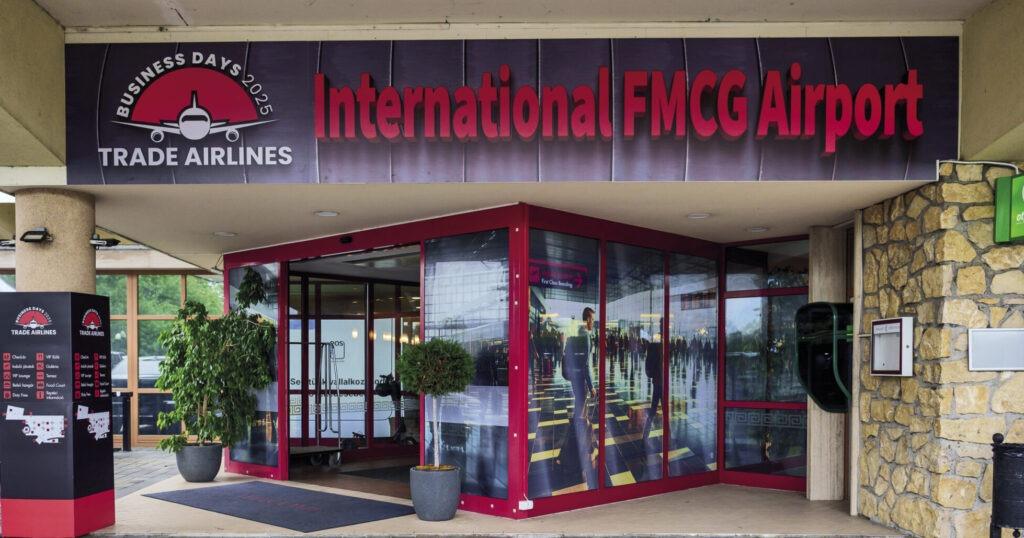
The entire fleet of Trade was ready to take off at the International FMCG Airport, prepared to serve guests flawlessly for five days
This article is available for reading in Trade magazin 2025/11.

Zsuzsanna Hermann managing director
and editor in chief welcomed the passengers
who had booked their flight as an air marshal
In her welcome speech Zsuzsanna Hermann, CEO and editor-in-chief of Trade magazin emphasised that the symbolism of aviation refers to the current challenges the industry is facing. At the Business Days Monday is traditionally devoted to the HoReCa sector.

Bálint Oláh
director
Mastercard
Bálint Oláh, director of Mastercard Advisors kicked off the day, with a presentation on the transformation of tourism. He used data-based examples to show how certain events generate outstanding traffic growth in hospitality and accommodation, such as the Taylor Swift tour or the Champions League final.
Building on research results

Tünde Turcsán
managing director
YouGov Shopper
The next speaker was Tünde Turcsán, managing director of YouGov Shopper, who presented the results of this year’s research, which was conducted by surveying thousands of Hungarian households. In his presentation.
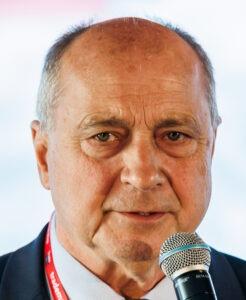
László Kovács
president
MVI
László Kovács, president of the Guild of Hungarian Restaurateurs (MVI) analysed the challenges and trends experienced by the domestic hospitality industry in recent years. The difficulties became truly apparent in the post-pandemic period and since then, the decline has been continuous: thousands of businesses are disappearing every year, putting the livelihoods of tens of thousands of people at risk. Restaurants and entertainment venues are particularly vulnerable, while confectioneries have proven to be more resilient.
Eating trends

Anna Zoltai
president
KÖZSZÖV
In her presentation on the possibilities for renewing mass catering, Anna Zoltai, president of the National Association of Public Sector Catering Service Providers (KÖZSZÖV) told: the approach used in recent decades, which focused on quantity and price, is now being replaced by a new wave of consumer expectations: eating is becoming an experience, a source of pleasure, and at the same time a responsible choice.

Dr. Beáta Olga Felkai
deputy state secretary
Agrárminisztérium
Dr Beáta Olga Felkai, deputy state secretary of the Ministry of Agriculture spoke about consumers seeking safe food, predictable food supply security and understandable labelling.

László Selmeczi
managing director
MCI
László Selmeczi, managing director of the Hungarian Confectioners’ Craft Union (MCI) introduced the situation and prospects of the domestic confectionery industry. MCI’s objective is to bring consumers closer to high-quality, handmade Hungarian ice cream, in addition to promoting competition among master confectioners. .
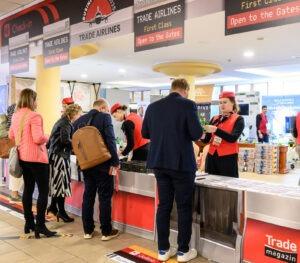
The event’s title ” blind flying refers to the current challenges of the industry, but among other things, everyone received a travel suitcase at the check-in counter

Ákos Bősze
HoReCa business
development executive
METRO
In the afternoon Ákos Bősze, METRO’s HoReCa business development executive gave an insight into the wholesaler’s latest survey on the current situation and trends in hospitality, analysed the consumption habits of Generation Z, and introduced the Tasty Hungary programme.
Trends and responses

István Bruzsa
sales manager
Nestlé Professional
A roundtable discussion followed, where István Bruzsa, sales manager of Nestlé Professional said he was optimistic despite the difficult economic environment. Their growth largely comes from the meat-free product category introduced three years ago, which is delivering stable results and sees increasing demand for meat-free foods.

Károly Gerendai
owner
Costes and Rumour
restaurants
Károly Gerendai, owner of the Costes and Rumour restaurants underlined that the hospitality industry has been struggling with external challenges for a long time. Market share can be increased through conscious management and portfolio building.

Zoltán Kőrössy
founding partner
Eventrend Group
Zoltán Kőrössy, founding partner of the Eventrend Group stressed that the domestic hospitality industry faces challenges similar to international trends: it is increasingly difficult to be profitable and there is a critical labour situation, a lack of generational succession and inflationary pressure.

Participants of the first roundtable discussion saw conscious market development and a professional approach as the key to resilience in the gastronomy sector
Offering quality service

Gergely Németh
commercial director
Chef Market
Gergely Németh, commercial director of Chef Market told that the company is building on high-quality service, expanding its product selection and maintaining the internal efficiency achieved during Covid, so they are currently on a growth path. With the acquisition of Culinaris, their offering has reached a premium level with fresh ingredients imported from the Rungis market in Paris.

Ákos Taferner
head of HoReCa
METRO
According to Ákos Taferner, head of HoReCa at METRO, the market is shrinking, so conscious development and a multi-channel presence are needed: in addition to traditional shopping in physical stores, delivery has become a fundamental service. The key to success is the continuous development of the product range and guaranteed price and quality assurance.
There was also time for celebration in the afternoon: between professional discussions, the results of the HoReCa Heroes 2025 competition were announced and the awards were presented to the winners.
The supplier perspective

Csaba Kanizsai Tóth
CEO
FÁN Group
In the second roundtable discussion of the day Csaba Kanizsai Tóth, the CEO of FÁN Group pointed out that the HoReCa segment appears to be the key to survival and growth, with more than 30% of the company’s sales going in this direction. Consumer habits are changing dramatically and deli counters are gradually disappearing from stores. .

Nándor Darvas
central dry goods
purchaser
Mirbesz
Nándor Darvas, central dry goods purchaser of Mirbesz shed light on the challenges of HoReCa supply from the supply chain side. Warehouse logistics and flexibility are important factors and the company ensures supply with nationwide coverage and 50,000m² of warehouse capacity.

Zoltán Pryma
HoReCa sales manager
Heineken
According to Zoltán Pryma, Heineken’s HoReCa sales manager, close cooperation is inevitable for survival: a genuine partnership has developed between the hospitality industry and beverage manufacturers. Rapidly changing consumer trends must be responded to immediately and collectively.
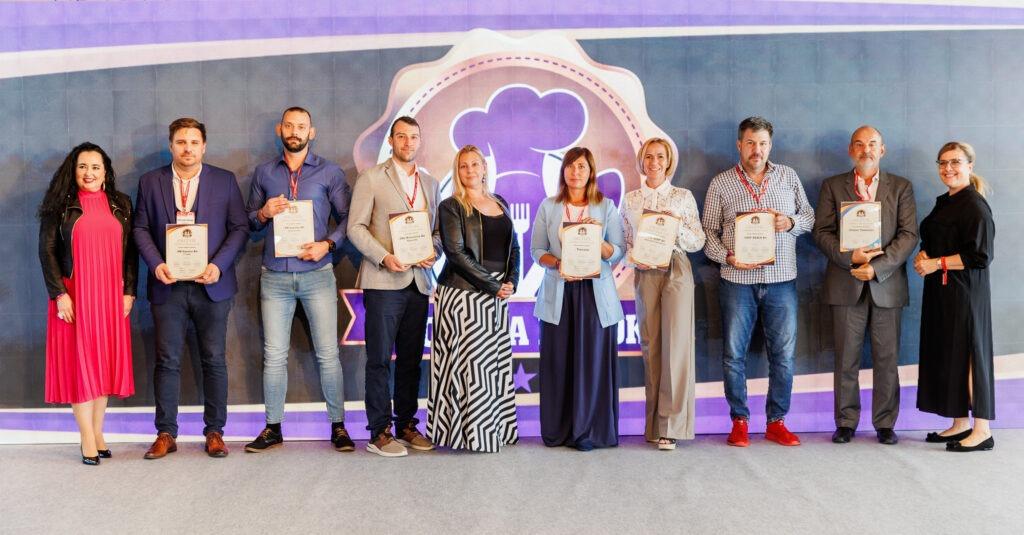
An afternoon celebration: between the professional discussions, the results of the HoReCa Heroes 2025 competition were announced and the awards were presented
Partnerships

Zoltán Rudolf Kiss
owner and managing
director
XXL Catering
In the field of outdoor and festival catering the key to success is supplier reliability and fast response times, explained Zoltán Rudolf Kiss, owner and managing director of XXL Catering. When selecting a supplier, the decisive factor is who can deliver at short notice, even at extreme times and in large quantities.

János Töreki
general manager
Mazel Tov and Balagan
restaurants
János Töreki, general manager of the Mazel Tov and Balagan restaurants noted: because of the very small stock levels even a single delay can disrupt the entire day’s preparations, so supplier flexibility is crucial. Today there is a genuine partnership between manufacturers, distributors and restaurants, with a common goal: survival. Monday ended with a lively discussion with the young managers of two well-known confectionery family businesses. .
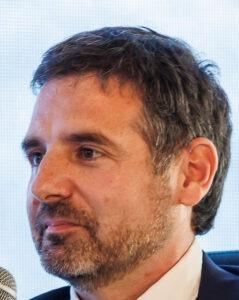
Ádám Kelényi
owner-CEOő
Szamos Marcipán
Ádám Kelényi, owner and CEO of Szamos Marcipán told his parents quickly involved him in the business in the 2000s: his responsibilities increased, but they made sure that the workload was gradual. His grandfather’s zest for life and work ethic are also part of his heritage. .

Ádám Pataki
owner
Pataki Confectionery
Ádám Pataki, owner of Pataki Confectionery talked about how he was introduced to the profession at an early age. His grandmother was the guardian of good order, while his mother helped with the guests. From them he learned humility, the priority of customer satisfaction, curiosity and openness.
On Monday the evening ended with a METRO cocktail party and oyster tasting, followed by dinner, a concert and a raffle.

The Monday evening atmosphere was set by a spectacular concert from Mariann Falusi

METRO’s cocktail party and oyster tasting added a touch of exclusivity to the evening
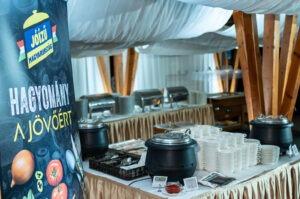
Goulash Party – At the conference, METRO launched the “Flavourful Hungary” program, and alongside it, we indulged in the delicious offerings of the “Year of Goulash”

On the first day, communications expert
Emília Krug oversaw order on board in the
role of stewardess
Emília Krug continued to work as the “flight attendant” on the Tuesday flight.

Viktória Haász
managing consultant
Mastercard
Hungarian consumer confidence is historically low, said Viktória Haász, managing consultant of Mastercard in her opening presentation.
Drawing on the company’s latest European research, she concluded that although saving is still the most popular strategy among consumers in difficult times, Generation Z is increasingly unwilling to cut back on its spending, as shopping is also about the experience and social interaction for them.
Pressure to make changes

Dr. Ákos Kozák
co-founder
Equilibrium Institute
The next presenter was Dr Ákos Kozák, co-founder of the Equilibrium Institute. He stated that the Hungarian economy has reached a dead end and a new recipe is needed. Inflation is fuelled not only by food, but also by services and energy. Wages are growing dynamically, but productivity growth is much more subdued at only 4% since 2019.
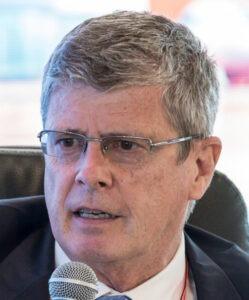
Dr. Tamás Kozák
secretary general
OKSZ
Next Dr Tamás Kozák, secretary general of the National Trade Association (OKSZ) stepped on the podium. Reviewing the trade policy of the past period, he concluded that economic management measures have gone beyond the framework system of economic logic on several occasions, which can distort the real market environment and trade performance.

Dr. Beáta Olga Felkai
deputy state secretary
Ministry of Agriculture
In the first roundtable discussion of the day Dr Beáta Olga Felkai, deputy state secretary of the Ministry of Agriculture and Tamás Éder, president of the Association of Responsible Food Producers (FÉSZ) joined the speakers.
Dr Beáta Olga Felkai pointed out that the government’s current funding system tries to take into account differences in company size and markets.

Tamás Éder
president
FÉSZ
Tamás Éder expressed his opinion that the number, speed and quality of government measures don’t facilitate the development and building of lasting, trust-based business partnerships.
Dr Tamás Kozák underlined that today it isn’t food processors and retailers that compete with each other, but product chains.
Dr Ákos Kozák mentioned that one remedy for the efficiency problems experienced in the industry could be concentration and “leaps in size”.

On the second day of the event, new captains and new passengers arrived, filling even the largest passenger aircraft with professionals from the FMCG sector
The 2025 Retail Award of Excellence for Hungarian Products was presented
Established by Hungarian Product Nonprofit Kft. and Trade magazin, the Retail Award of Excellence for Hungarian Products recognises the commitment and outstanding work of retail chains in promoting Hungarian products. The 2025 award was presented by Dr Beáta Olga Felkai (deputy state secretary of the Ministry of Agriculture) together with the founders, at our magazine’s Business Days conference.

Winners of the Retail Award of Excellence for Hungarian Products oictured with dr. Beáta Olga Felkai, deputy state secretary of the Ministry of Agriculture, Zsuzsanna Hermann, editor-in-chief of Trade magazin (to the left), and Eszter Benedek Eszter, managing director of Magyar Termék Kht. (to the right)
CBA Kereskedelmi Kft. and PENNY Market Kft. shared the first place in 2025. The jury also announced two silver medallists: Auchan Magyarország Kft. and METRO Kereskedelmi Kft. were the runners-up, while the bronze medal went to SPAR Magyarország Kereskedelmi Kft. The Customer Choice Award of Excellence for Hungarian Products was also presented. A total of 8,258 people participated in an online survey conducted in June 2025 and 28.8% of respondents said that SPAR stores were the easiest place to find products bearing the Hungarian Product label.
Long shadows
On the first scheduled “flight” after lunch the situation of suppliers was discussed.

Tamás Éder
president
FÉSZ
,
FÉSZ president Tamás Éder told that in 2024 the volume index of food industry production showed a nearly 4% rise, but this couldn’t compensate for the 12% decline in 2023, and the first half of 2025 brought another drop.
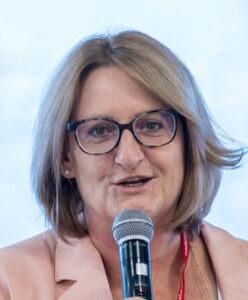
Anita Mekler
consumer and retail
industry leader
PwC
Anita Mekler, PwC’s consumer and retail industry leader used their recent research results to reveal: Hungarian consumers are more concerned in 2025 vs. the previous year when it comes to inflation, geopolitical conflicts, macroeconomic volatility and health risks.
Participants of the second roundtable of the day were Gergely Bálint, director of corporate sales at Nestlé, György Galántai, commercial director of HELL Energy, Éva Kulich, Goldenburg’s sales and marketing director at Haladás MG Zrt. and Péter Szautner, deputy CEO and strategy director at Bonafarm.

Gergely Bálint
director of corporate
sales
Nestlé
Gergely Bálint expressed his view that stimulating consumption could only be managed by improving relative price competitiveness, which proved to be a critically important step from the perspective of both suppliers and retailers. 2024-ben az élelmiszer-fogyasztás holtpontra került, erős inflációval, magas árakkal, csökkenő volumenekkel nézett szembe az iparág, a 2025-ös év növekedési perspektívái aggasztóak voltak az év elején.

György Galántai
former director of
corporate sales
HELL Energy
HELL ENERGY Magyarország Kft. has kept its consumer prices unchanged for three years now, we learned from György Galántai. The company is ensuring growth by expanding its portfolio and introducing new-generation products.

Éva Kulich
sales and
marketing director
Haladás MG, Goldenburg
In potato production, most of the input materials (such as the seed potatoes themselves) are currently imported, Éva Kulich told the audience.

Péter Szautner
deputy CEO
Bonafarm
Péter Szautner revealed they feel that the relationship between suppliers and retailers has improved. Companies are caught between sectoral regulations and cost factors, and this favours import.
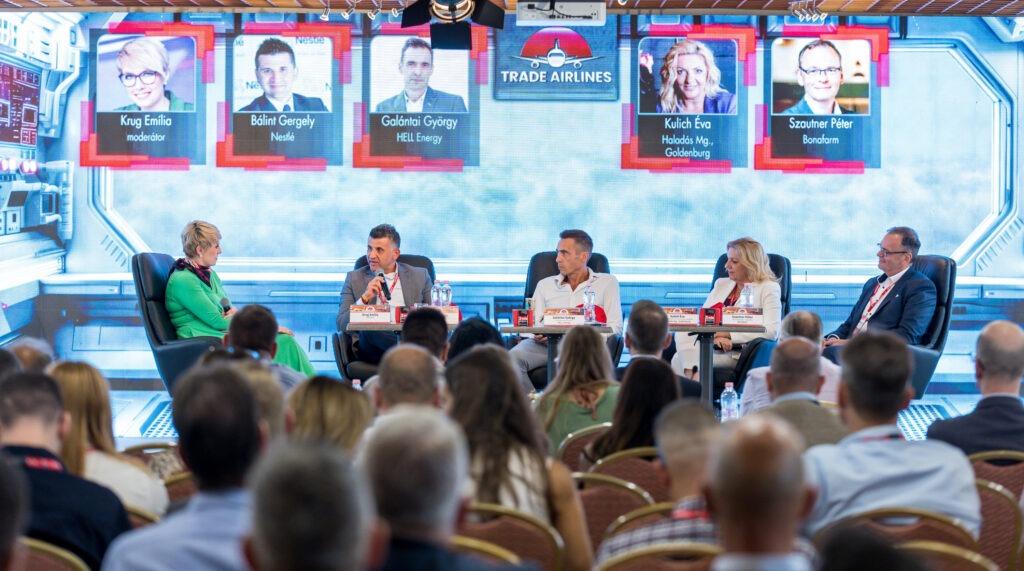
The supplier roundtable explored possibilities for moving beyond the current stalemate
Relationships put to the test
In the afternoon work continued with another roundtable discussion, this time for retail buyers: Zoltán Nepp, head of purchasing at Lidl, Zoltán Noszlopy, deputy CEO and purchasing director of CBA, Tamara Péter, head of fresh food buying at Tesco, Attila Szabó, head of buying at CO-OP Hungary, László Varga, product director of Auchan and Krisztina Várkonyi, purchasing director at SPAR.

Zoltán Noszlopy
deputy CEO and
purchasing director
CBA
According to Zoltán Noszlopy, they face more and more challenges every year. They maintain excellent relationships with their supplier partners.
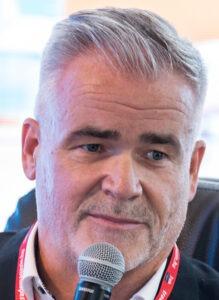
László Varga
product director
Auchan
László Varga emphasised that every chain has its own strengths. Suppliers need to be made aware of this, as they can help retailers improve their shared results by raising issues and requesting solutions.
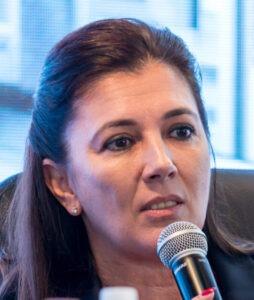
Krisztina Várkonyi
purchasing director
SPAR
Krisztina Várkonyi pointed out: when the government intervention was introduced, the common interest and objective was to curb inflation with the margin freeze, and at the time it was promised that the regulation would be phased out in May. The retail sector did everything it could, but the measure stayed.

Zoltán Nepp
head of purchasing
Lidl
Zoltán Nepp said that although there has been much greater understanding and openness between retailers and suppliers since the Covid pandemic, disputes are now more heated, as small details can make the difference between gains and losses.

Attila Szabó
head of buying
CO-OP Hungary
Attila Szabó isn’t worried about prices skyrocketing if the margin freeze is lifted. He reckons that both supply and demand have narrowed.

Tamara Péter
head of fresh
food buying
Tesco
The recent period has put Tesco’s relationships with suppliers to the test, revealed Tamara Péter.
Fortunately, they have had successful negotiations with most suppliers in the spirit of long-term partnerships. After the last “takeoff” of the day, participants could take a bird’s eye view of domestic chains and tobacco shops.
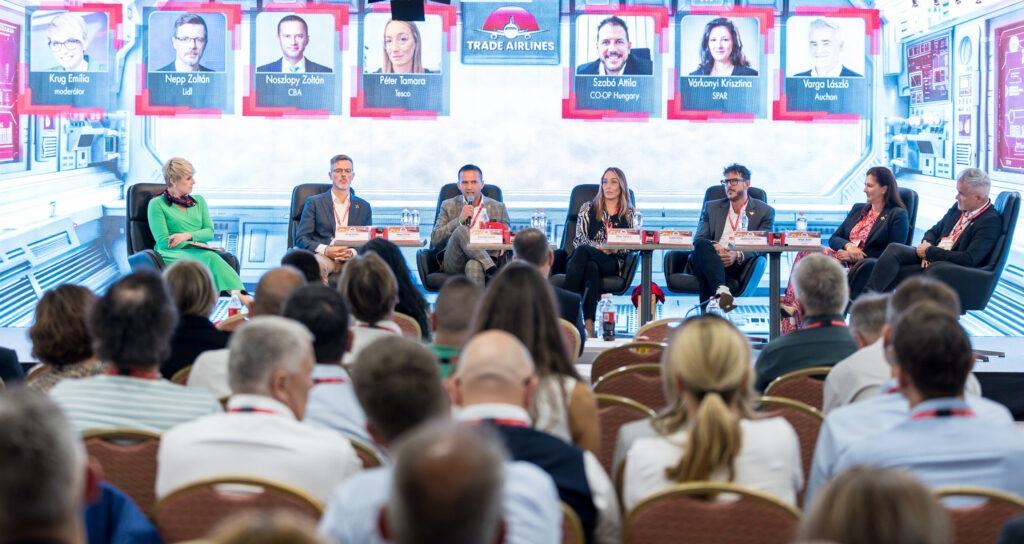
With the right level of cooperation, strong partnerships can be maintained — this was emphasized during the procurement roundtable discussion

Andreas Christou
managing director
RetailZoom
Andreas Christou, managing director of RetailZoom talked about domestic chains having acquired lots of new customers, mainly from independent retailers. Promotions and private labels have never had a higher share than they do today.

Lajos Szabó
head of retail
Szerencsejáték
Lajos Szabó, head of retail at Szerencsejáték introduced the company’s product portfolio and sales solutions. Szerencsejáték Zrt. focuses on network expansion this year.
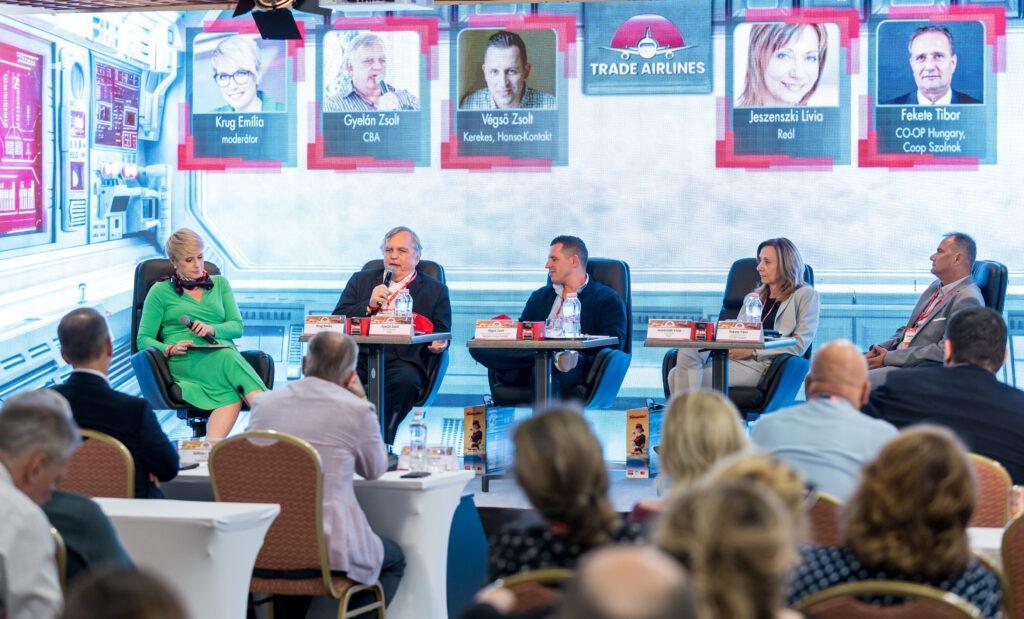
Representatives of domestic retail chains concluded that market regulations have a particularly adverse impact on smaller-sized stores
From heroes to scapegoats
Tuesday’s last roundtable discussion took place among the “pilots” of domestic retail chains: Tibor Fekete, member of the board of CO-OP Hungary and president and CEO of Coop Szolnok, Zsolt Gyelán, vice president of CBA, Lívia Jeszenszki, managing director of Reál and Zsolt Végső, co-owner of Kerekes and Hansa-Kontakt.

Zsolt Gyelán
vice president
CBA
Zsolt Gyelán predicted that small stores will face enormous problems. They have no reserves to survive the bad years.
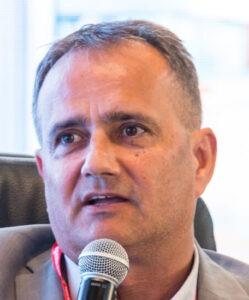
Tibor Fekete
member of the board
CO-OP Hungary
Tibor Fekete called attention to the fact that products falling under the scope of the margin freeze account for an above-average share of sales by small shops (up to 40%), as they are basic foodstuffs. This makes it much more difficult for them to compensate for the loss of profit caused by price regulations with other goods.

Lívia Jeszenszki
managing director
Reál
The situation of small independent small shops has deteriorated further over the past year, noted Lívia Jeszenszki. Small shops belonging to domestic chains are in a slightly better situation.

Zsolt Végső
co-owner
Kerekes and
Hansa-Kontakt
Since 2020 the sector has been continuously affected by external factors that dwarf the talent of companies in this segment, commented Zsolt Végső. Smaller stores are in a better position if they are backed by a chain, but even that doesn’t guarantee survival.
Marketing plays a very important role, emphasised Zsolt Végső. In his view small stores will have a real chance to grow when government regulations are lifted and the market economy returns.

Ferenc B. Tóth
country manager
myPOS CEE
To conclude the day Ferenc B. Tóth, country manager of myPOS for Central and Eastern Europe spoke about optimising and reducing the security risks of bank card payments. While minimising the possibility of card data theft, system downtime or risks arising from non-compliance with regulations, consumers must be offered fast, cost-effective, simple and innovative payment options

Airport Song Festival – Wednesday evening was all about nostalgia, featuring performers like Péter Poór, Cecília Esztergályos, Andrea Szulák, and Rezső Soltész, followed by a string of popular hits with DJ Dominique
On the third day of the Business Days conference Szilvia Krizsó took up her shift as a flight attendant on Trade Airlines flights.

Wednesday morning, communications expert Szilvia Krizsó joined Air Marshal Zsuzsanna Hermann on board in the role of flight attendant
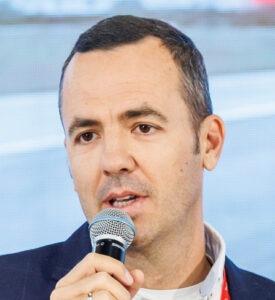
Gyula Gallina
business development
director
Mastercard
Wednesday began with a focus on the aircraft’s black box, as Gyula Gallina, Mastercard’s business development director presented the results of their e-commerce research. Due to the rapid transformation of consumer habits, the rise of foreign platforms and economic uncertainty, retailers must constantly adapt.
In Hungary the sector grew by 12%, with 35% of purchases concentrated in Budapest. The digital payment experience has a direct influence on consumer activity.
E-commerce in turbulence
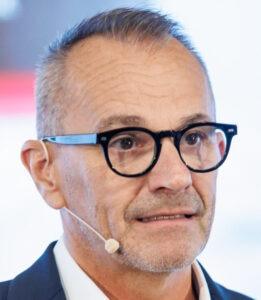
Tibor Bodor
head of corporate divisionK&H Bank
Next Tibor Bodor, head of corporate division at K&H Bank took the podium, to tell that according to K&H’s large company growth index, the long-awaited turnaround has yet to materialise: firms are more pessimistic about the economy and the outlook in the retail sector is gloomier than average.

Tünde Turcsán
managing director
YouGov Shopper
The next speaker was Tünde Turcsán, managing director of YouGov Shopper Hungary, who gave an insight into the purchasing habits of Hungarian households. She mentioned that the financial situation of domestic consumers remains highly polarised, with purchasing power at only 62% of the European average. .

Norbert Madar
head of digital
commerce
PwC Magyarország
To conclude the session Norbert Madar, head of digital commerce at PwC Magyarország analysed e-commerce trends. He told that Hungarian e-commerce reached a HUF 1,948bn turnover in 2024, 18% of which was driven by imports – mainly due to the strengthening of Temu. Online spending accounted for 10.2% of total retail sales.

Rita Szalma
senior business developer
Temu
In keeping with the style of this segment, Rita Szalma, Temu’s colleague responsible for business development, made a brief surprise appearance at the end of the presentation to say hello.
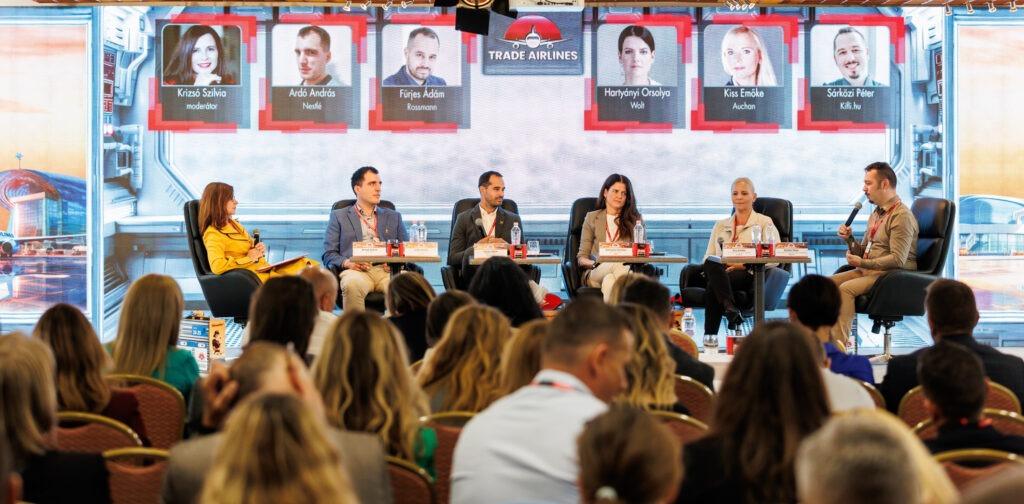
The “captains” of Wednesday’s first roundtable discussion explored the digital dimensions of the airspace
Regional successes, national dilemmas
The programme continued with a roundtable discussion on the challenges and successes of e-commerce.
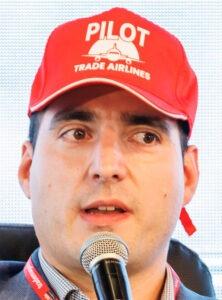
András Ardó
e-commerce lead
Nestlé
András Ardó, e-commerce lead of Nestlé approached the issue from the perspective of manufacturers, saying that his company represents a channel-less viewpoint: this goes beyond the omnichannel approach and treats online and offline sales spaces in an integrated fashion, as Nestlé products can be found on both physical and digital shelves.
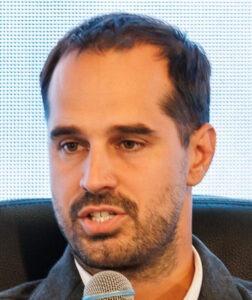
Fürjes Ádám
head of webshop
Rossmann
Referring to research results Ádám Fürjes, head of the Rossmann webshop added that drugstore products aren’t typically purchased in Asian online stores, so this segment is less affected by the phenomenon. One of the most influential factors in recent years has been – and will continue to be – that it is no longer acceptable for FMCG players to generate losses: at least they have to break even in e-commerce.
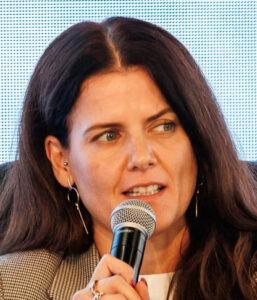
Orsolya Hartyányi
managing director
Wolt
Orsolya Hartyányi, general manager of Wolt pointed out that it is definitely worth contracting a courier service company instead of using own couriers. Wolt works with local partners, 97% of whom are small and medium-sized enterprises. Their average delivery distance is less than 3km. .
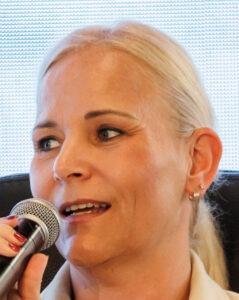
Emőke Kiss
e-commerce director
Auchan
Emőke Kiss, e-commerce director of Auchan talked about the stagnation or losses made in the recent period. There has been a change of ownership at Auchan, which has meant that a new identity and new directions had to be defined. These strategies have just been launched and she is very happy, because they are committed to maintaining all of their operations.

Péter Sárközi
marketing planning and
operations manager
Kifli.hu
Péter Sárközi marketing planning and operations manager of Kifli.hu pointed out that one of the most difficult aspects of customer acquisition at Kifli.hu was whether people would dare to shop online. Thanks to Temu, many people tried online shopping and experienced that they could safely receive the items they ordered on a virtual platform.
Upcycling – a category that creates business value

Júlia Dalmadi
founder
TransFoodMission
Júlia Dalmadi was the next speaker – she is the founder of TransFoodMission and an advisor to the Rohlik Group’s upcycling portfolio. She talked about how waste reduction has become a new, profitable retail category. Upcycling is no longer just a sustainability issue, but a business strategy that simultaneously supports profit growth, achieving ESG goals and customer loyalty.

László Varga
sales and
marketing director
DPD
The morning programme ended with László Varga, DPD’s sales and marketing director stating that the growth of e-commerce in Hungary and Europe continues to be dynamic. 81% of regular Hungarian online shoppers consider time savings to be the biggest advantage, while 70% say that online shopping reduces the stress associated with shopping in stores. 73% of shoppers are constantly looking for the best deals
A restructuring in logistics
The afternoon programme continued with a logistics roundtable, with Szilvia Krizsó as the moderator.

Szabolcs Czifrik
managing director
DPD
Despite the fact that the share of online FMCG sales has jumped from 1.2% to 2.9% and further exponential growth is expected, customers don’t necessarily see the enormous potential inherent in logistics service providers, said Szabolcs Czifrik, the CEO of DPD Hungária Kft.

Nikoletta Kiss
owner-managing director
PalmSped
Nikoletta Kiss, the owner and CEO of PalmSped highlighted the difficulties of international road transport and pointed out: owing to the volume crisis, it wasn’t possible to pass on the increased transport costs to customers in full.

Alexandra Banovics
former commercial
director
MHC Mobility
Alexandra Banovics, former commercial director of MHC Mobility sees longer decision-making processes in fleet services this year, following after last year’s growth. Similar to the Covid period, there is a kind of wait-and-see attitude at the moment.

Csaba Árvai
CEO
Boxy
Csaba Árvai, the CEO of Boxy underlined that despite the decline in freight volumes, logistics capacity remains underutilised and opportunities are further confined by platforms in the Far East, which only employ limited logistics.
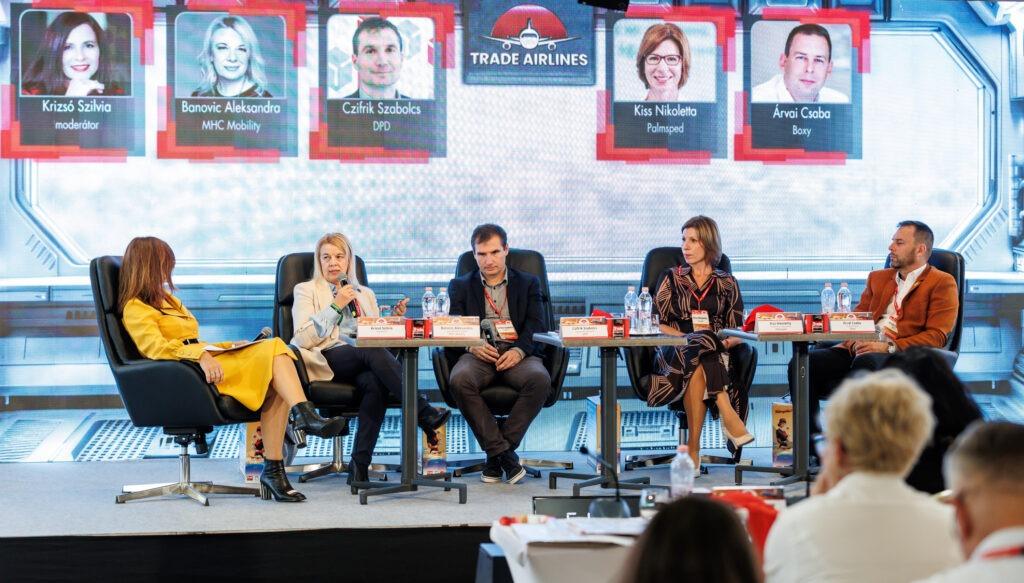
The participants of the second roundtable discussion highlighted that price pressure and extreme competition are also affecting logistics service providers
SupplySmart – Pack and ship smart!

Gyula Mazan
innovation manager
Smurfit Westrock

Adriana Kottrova
key account manager
Smurfit Westrock
Gyula Mazan, innovation manager and Adriana Kottrova, key account manager from Smurfit Westrock used a simulated case study to illustrate how their digital tools can already help prepare for compliance with the PPWR, which will come into force in 2026.
PPWR Review can support keeping the empty space ratio in packaging below 50%, while the Store Visualizer helps customers to predict the success of their packaging and the brand’s in-store appearance with 90% accuracy.
Digital pillow fight: opportunity, stagnation, struggle and success

Réka Hilzinger
head of sales
Billerbeck
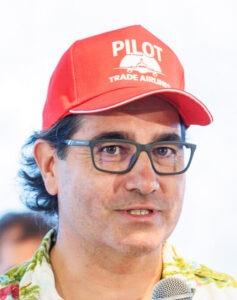
Péter Győri
chief operating officer
Infinite’s Hungarian
organisation
Réka Hilzinger, head of sales at Billerbeck and Péter Győri, chief operating officer of Infinite’s Hungarian organisation gave a joint presentation on the digitalisation project of the two companies, which aimed to channel Billerbeck’s domestic resellers into a single system and to automate their orders. The reseller system now handles orders from more than 100 partners, while the level of automation reached an 80% level.
Retail at petrol stations: transformation and the need to adapt
On a daily basis, the greatest challenges in the Hungarian fuel retail market stem from the complexity of the industry and the transformation processes.

Dr. Zoltán Füzes
mobility director
Shell Magyarország
Dr Zoltán Füzes, mobility director of Shell Magyarország highlighted the operation of hundreds of service stations and the coordination of thousands of employees as ongoing operational challenges. Shell’s strategy is based on the principle of “more value with less emission”.

Péter Gyúrós
director of retail
operations
Orlen
According to Péter Gyúrós, director of retail operations at Orlen, the greatest pressure comes from the need to increase sales. Orlen is in a special situation: the company is undergoing a major transformation from a medium-sized enterprise into a modern, multinational service provider.

Ján Hrivňák
managing director and
head of retail
OMV
OMV’s transformation began in 2024 and it also brought about a change in mindset, according to managing director and head of retail Ján Hrivňák. The company is open to sustainable and e-mobility and it is focusing on developing premium services.
When discussing the logistics and human resources related challenges of managing shops, mini-cafés and FMCG products, the experts agreed that the role of staff is crucial.

According to the “tanker” captains, their greatest daily challenges stem from the complexity of the industry and the ongoing transformation processes
Regulation, strategy and a mindset change – sustainability in the crossfire
After the Symbol of Sustainability 2025 award ceremony there was a roundtable discussion on the topic.

Gergely Hankó
managing director
KSZGYSZ
According to Gergely Hankó, managing director of the Hungarian Association of Environmental Enterprises (KSZGYSZ), deeper transformation is needed in business processes, product portfolios and consumer attitudes than the current superficial efforts, and for this a supportive regulatory and financing environment would be essential.

Irén Márta
managing director
BCSDH
Irén Márta, managing director of the Business Council for Sustainable Development in Hungary( BCSDH) presented some interesting data to the audience: according to a recent survey by the organisation, although 91% of member companies already perceive the business impacts of climate change, only 16% have an adaptation plan.

Nóra Szabó
ESG specialist
Mastercard
Nóra Szabó, ESG specialist of Mastercard explained: raising sustainability to a strategic level is currently a major challenge for the company, especially as a European entity of a US-based firm. The new direction is integration into core operations, which focuses on developing the digital payment ecosystem rather than consumer education.

László Büki
honorary president
FeCso
László Büki, honorary president of the Association for Sustainable Packaging and owner of BS Plastic expressed his view that there is no single definition of sustainability, especially when it comes to packaging materials. In his opinion it is always a unique, company-specific issue that can’t be treated in a formulaic manner.

Ivan Holub
sustainability lead
Danone CEE
In his presentation Ivan Holub, sustainability lead of Danone in the Central and Eastern Europe region emphasised that in the shadow of economic and geopolitical challenges, climate change remains a serious but often underrepresented threat. Danone has built its strategy on three pillars to ensure authentic, transparent and sustainable business operations: health, people/communities and nature.

Winners of the 2025 Symbol of Sustainability Award (Detailed coverage of the winners can be found in the 2025/8–9 issue of Trade Magazine)

Zoltán Szőnyi
sales director
Dunapack Packaging
Zoltán Szőnyi, cluster sales director of Dunapack Packaging showed how the company has combined digitalisation, environmental consciousness and packaging material development into a unified system. They made operations more efficient by introducing the LEAN approach, treating sustainability not only as a goal, but also as a business tool.
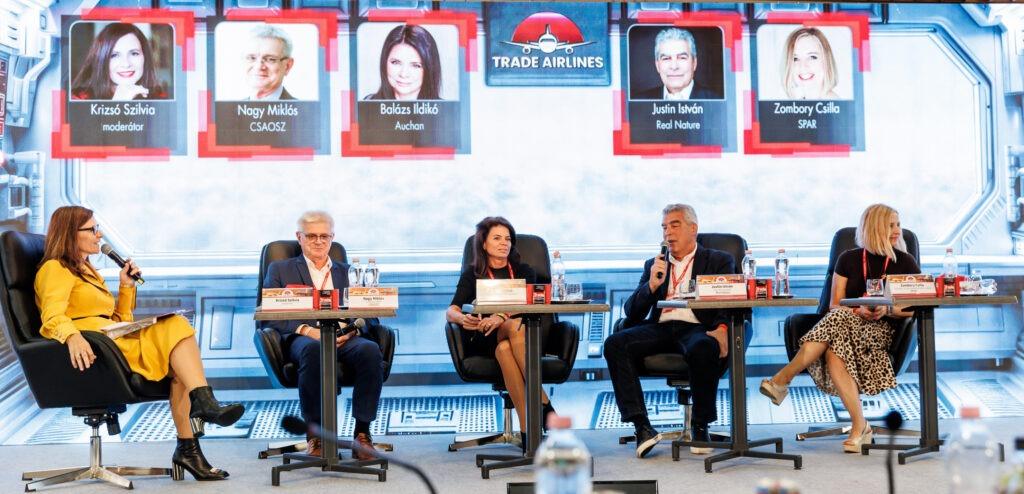
Representatives from advocacy groups, suppliers, and the retail sector emphasized during the day’s final discussion that sustainability also requires professionally grounded regulation and meaningful consultation
Dialogue would be crucial
At the end of the day a roundtable discussion analysed the situation of retailers and suppliers from a sustainability perspective.

Ildikó Balázs
director of corporate
relations
Auchan
Ildikó Balázs, director of corporate relations at Auchan highlighted that the planned postponement of the EUDR’s entry into force could be a significant relief for stakeholders, as monitoring deforestation requires a complex system and background work.
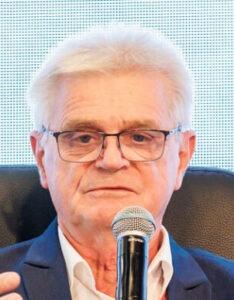
Miklós Nagy
professional secretary
CSAOSZ
Miklós Nagy, professional secretary of the National Association of Packaging and Materials Handling (CSAOSZ) called attention to the fact that it is difficult for trade organisations to support companies with reliable information, whose investments and developments depend on the accurate interpretation of regulations. .

Csilla Zombory
head of quality and
environment
SPAR
Csilla Zombory, SPAR’s head of quality and environment reported serious operational and communication problems in connection with the DRS.

István Justin
COO
Real Nature
István Justin, Real Nature’s chief operating officer confirmed that suppliers are aware of the difficulties that retailers need to face, and he believes that the only way to solve these problems is through collective thinking.

Szilvia Bódi
cluster sales, marketing
and innovation director
DS Smith
Szilvia Bódi, cluster sales, marketing and innovation director of DS Smith talked about how to “capture” Generation Z, whose members are climate-conscious and for whom it is very important what and where they purchase, where the product comes from, what supply chain it comes through and what message it conveys.

Dániel Jellinek
owner and CEO
INDOTEK Group

Gergő Soltész
investment and financial
expert
In the closing discussion of the day, the audience heard from Dániel Jellinek, the CEO and owner of INDOTEK Group about investing in Auchan, and from Gergő Soltész, investment and financial expert and winemaker about the general situation of the domestic wine market.



On Wednesday evening, guests at the BBQ party were looking forward to the concert even more than the many delicious treats. This year, performances by TNT and Kozmix were followed by a spectacular Fergeteg Party featuring DJ Dominique

Related news
Related news
GDP growth in OECD member countries slowed to 0.3 percent in the last quarter of last year
🎧 Hallgasd a cikket: Lejátszás Szünet Folytatás Leállítás Nyelv: Auto…
Read more >Equilibrium Institute: GDP growth this year, but consumption remains the driving force
🎧 Hallgasd a cikket: Lejátszás Szünet Folytatás Leállítás Nyelv: Auto…
Read more >







